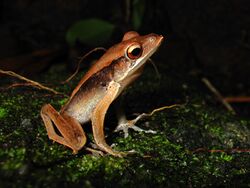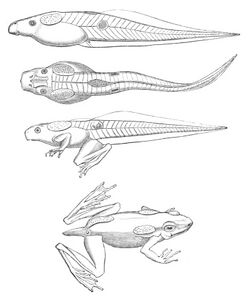Biology:Clinotarsus alticola
| Clinotarsus alticola | |
|---|---|

| |
| Scientific classification | |
| Domain: | Eukaryota |
| Kingdom: | Animalia |
| Phylum: | Chordata |
| Class: | Amphibia |
| Order: | Anura |
| Family: | Ranidae |
| Genus: | Clinotarsus |
| Species: | C. alticola
|
| Binomial name | |
| Clinotarsus alticola (Boulenger, 1882)
| |
| Synonyms | |
| |
Clinotarsus alticola[2][3] is a species of frog in the family Ranidae. Common names for this species include: Assam Hills frog, Annandale's frog, pointed-headed frog, palebrown stream frog, hill frog, point-nosed frog, and high-altitude frog. It is found in Hills of Meghalaya and northeastern India (Assam, Meghalaya, Mizoram, Nagaland, Tripura, and West Bengal) to northern Bangladesh, possibly into Bhutan and Nepal.[4]
Habitat
Clinotarsus alticola inhabit evergreen forests near large streams (the habitat for their tadpoles) in hill areas, usually near waterfalls.[1]
Description
Clinotarsus alticola are sexually dimorphic: males are 32–47 mm (1.3–1.9 in) in snout–vent length and females 43–61 mm (1.7–2.4 in). The advertisement call of males is a bird-like "chirp". In breeding sites, males greatly outnumber females and attempt to dislodge one another from the backs of females. Outside the breeding season adult Clinotarsus alticola are rarely encountered.[5]
The tadpoles of Clinotarsus alticola are distinctive: they are large (up to 98 mm (3.9 in) in length), have many glands, and are black in colouration with red ocelli. The caudal ocellus is a unique feature among ranid tadpoles. Its colouration may be aposematic.[6]
References
- ↑ 1.0 1.1 Peter Paul van Dijk, Annemarie Ohler, Sushil Dutta, Sabitry Bordoloi, Sohrab Uddin Sarker, Mohini Mohan Borah (2004). "Clinotarsus alticola". IUCN Red List of Threatened Species 2004: e.T58540A11798892. doi:10.2305/IUCN.UK.2004.RLTS.T58540A11798892.en. https://www.iucnredlist.org/species/58540/11798892. Retrieved 19 November 2021.
- ↑ "Catalogue of Life". http://www.catalogueoflife.org/details/species/id/7161130. Retrieved March 27, 2012.
- ↑ "Encyclopedia of Life". http://eol.org/data_objects/17317800. Retrieved March 27, 2012.
- ↑ "Clinotarsus alticola (Boulenger, 1882)". http://research.amnh.org/vz/herpetology/amphibia/Amphibia/Anura/Ranidae/Clinotarsus/Clinotarsus-alticola.
- ↑ Sailo, S. (2010). Studies on the ecology and biology of Rana alticola Boulenger (PhD thesis). Shillong: North-Eastern Hill University. pp. 196.
- ↑ Grosjean, S; M Perez; A Ohler (2003). "Morphology and buccopharyngeal anatomy of the tadpole of Rana (Nasirana) alticola (Anura: Ranidae)". Raffles Bulletin of Zoology 51 (1): 101–107. http://rmbr.nus.edu.sg/rbz/biblio/51/51rbz101-107.pdf.
Wikidata ☰ Q4454347 entry
 |



